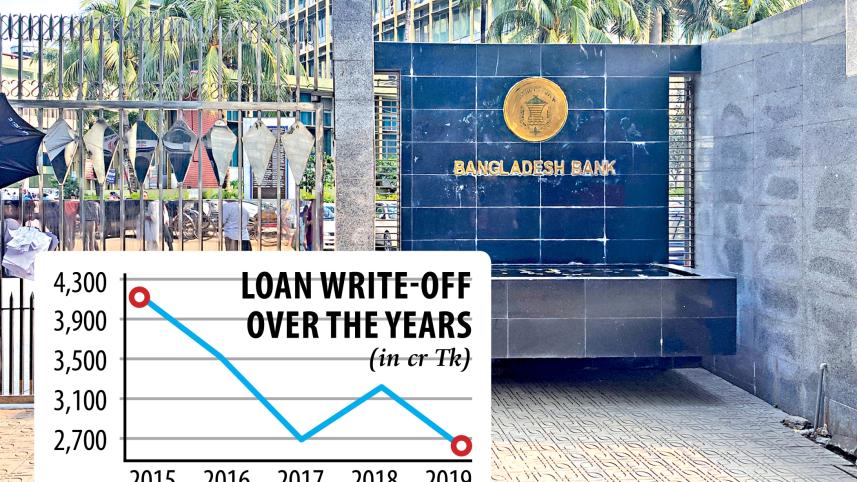Loan write-offs sink to a five-year low

Loans written-off by banks plunged to a five-year low in 2019 as lenders preferred relaxed rescheduling facility offered by the central bank to clean up their balance sheets.
In banking, banks write off bad debt that is declared non-collectable, removing it from their balance sheets.
Last year, loans amounting to Tk 2,597 crore were written-off, down 19.03 per cent from a year earlier, according to data from the central bank.
Banks have to keep 100 per cent provisioning against the written-off loans, making it difficult for many lenders amid lower incomes. This led lenders to use the relaxed rescheduling facility to bring down their defaulted loans, bankers say.
In 2019, defaulted loans totalling Tk 50,186 crore were regularised, the highest on record for a single year.
Of the sum, Tk 18,584 crore was regularised under the central bank's relaxed policy announced in May last year.
The facility allows defaulters to reschedule classified loans by just making a down payment of only 2 per cent of their outstanding amount instead of the existing 10-50 per cent.
Banks recovered Tk 479 crore in down payment from the loans rescheduled under the policy.
Lenders were not keen to write off defaulted loans last year as they have to keep a large amount in provisioning from profits, said M Kamal Hossain, managing director of Southeast Bank.
"Many banks are even failing to give dividends to shareholders. How could they then clean up the balance sheets using the write-off tool?"
The rescheduling facility has helped banks push aside the defaulted loans, Hossain said.
Despite a large amount of loans being rescheduled, defaulted loans went up 0.42 per cent year-on-year to Tk 94,313 crore last year.
Written-off loans would have increased significantly if banks had not got the relaxed rescheduling facility, said Zahid Hussain, a former lead economist of the World Bank's Dhaka office.
Banks' efforts to clean up the balance sheet using the facility will not bring any good for them.
"In many cases, rescheduled loans turn into default loans. So, the financial health of banks may not be long-lasting," he said.
Some Tk 13,284 crore of the soured loans that were regularised last year have become defaults once again, BB data showed.
Sponsor-directors have received dividends by avoiding written-off loans, said Ahsan H Mansur, executive director of the Policy Research Institute of Bangladesh.
Assets in the banking sector could have widened had lenders maintained provisioning against their soured loans, he added.
Khondker Ibrahim Khaled, a former deputy governor of the central bank, echoed Mansur.
Banks are trying to paint a better picture for their financial health either by using the write-off tool or the loan rescheduling facility. "But the financial health of banks will not improve in reality."
"Default loans will go up once again, which may hit the banking sector in a dreadful way in the days ahead. And we have to face difficulties in tackling the situation," Khaled added.
A total of Tk 56,016 crore has been written off since the facility was introduced in January 2003.
Of the amount, 79 per cent has remained outstanding to date, meaning banks' efforts to recover the loans did not bear much fruit.
As of December last year, state-owned banks have written off Tk 23,258 crore and private banks Tk 30,889 crore.
Two state-run specialised banks -- Bangladesh Krishi Bank and Rajshahi Krishi Unnayan Bank -- wrote off Tk 604 crore and foreign banks Tk 1,265 crore.




 For all latest news, follow The Daily Star's Google News channel.
For all latest news, follow The Daily Star's Google News channel.
Comments